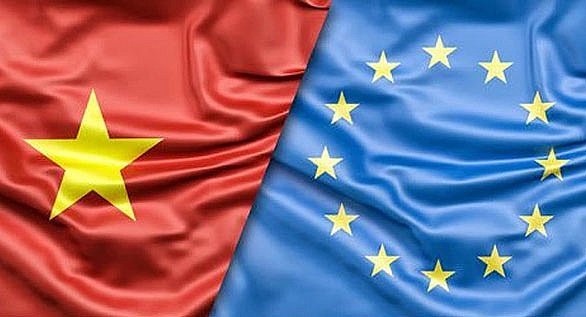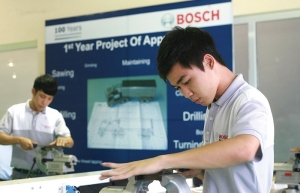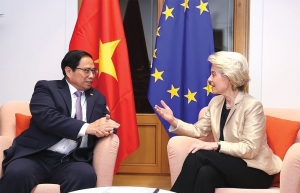French influence increases as Vietnam calls for EVIPA payoff
French Ambassador to Vietnam Nicolas Warnery told VIR that both nations will launch a number of large-scale events promoting trade in their respective territories this year.
 |
| French influence increases as Vietnam calls for EVIPA payoff, illustration photo |
“Trade and investment ties are among the key cooperation pillars of the two countries. It is expected that at the end of this year, Vietnam’s Minister of Planning and Investment will pay a visit to France to expand investment cooperation,” Warnery said. “We want to boost the implementation of ongoing projects like the metro line [in Hanoi] and other new projects.”
According to Vietnam’s Ministry of Planning and Investment (MPI), France ranks third among European countries that have invested in this country. As of February 20, France had 664 valid ventures in Vietnam, registered at a total of $3.78 billion.
“All but five companies of the CAC-40 (France’s 40 highest valuations on the Paris’ stock exchange) have set foot in Vietnam. Vietnamese people can see these companies at work in various fields, such as infrastructure projects like Hanoi’s third metro line, which benefits from French government financial support,” the ambassador said.
“These projects are never easy and they can suffer lengthy delays, but we are proud of what they are achieving and convinced they have much more to offer.” The current plan is for the elevated section to be open to the public this year.
Besides this, numerous French entrepreneurs have set up very successful companies in Vietnam, with Vergers du Mekong, Annam Gourmet, Aden Services, and Saint-Honoré being prime examples – all proof of Vietnam’s attractiveness.
While Vietnam is lacking in investment capital for developing infrastructure, urban planning, space, and industrial gas, many French companies are seeking to engage in these projects in the country.
Collecte Localisation Satellites (CLS) and Spatial Reference Information Systems (SIRS) want to work with the Vietnamese government on new projects here. CLS, which is a subsidiary of France’s National Centre for Space Studies, is implementing two satellite-based projects managing fishing activities, and long-range identification and tracking data for maritime traffic. It also intends to provide solutions for Vietnam to manage water resources, coastal ecosystems, flooding, and aquaculture.
Meanwhile, a representative from SIRS, which produces geographic data derived from satellite images said, “We want to provide services for agriculture, forestry, and land and water-related risk management in Vietnam.”
SIRS’ land services include control with remote sensing and monitoring, and risk and damage assessment in the case of natural, environmental, or technological disaster.
The ASEAN Secretariat’s recently released Investment Report 2023 has highlighted Vietnam’s efforts to offer investors opportunities in investing in infrastructure development such as roads, highways, logistics, and seaports.
“Vietnam is now open to the private sector with its programmes to attract investment and engage private sector partners in developing their infrastructure,” said the report. “In 2021, for instance, Vietnam’s transport ministry announced its transport infrastructure master plan between then and 2030, which is estimated to cost between $39.4 billion and $62 billion.”
This year, France and Vietnam will celebrate 50 years of diplomatic relations and the 10th anniversary of a strategic partnership. Hopes are also high that France will adopt the EU-Vietnam Investment Protection Agreement (EVIPA) to make it more favourable for investors from both nations to perform in their respective territories.
During a meeting with French Senate Speaker Gérard Larcher last December in Hanoi, Vietnamese Prime Minister Pham Minh Chinh suggested that France soon approve the EVIPA to facilitate equal relations in investment between the two countries.
Two weeks ago, PM Chinh also met French foreign trade minister Olivier Becht. Becht said the French government treasures France-Vietnam ties, which should be furthered with new solutions, including the EVIPA.
“French companies are greatly interested in investing in Vietnam, and they are awaiting the adoption of the EVIPA,” Becht said. “We also would like to boost the implementation of key economic cooperation projects between the two countries. France will continue boosting cooperation with Vietnam in sectors that are its strengths, such as response to climate change, development of urban transport infrastructure, healthcare, renewable energy, aviation, and e-government.”
Vietnam’s Ministry of Foreign Affairs (MoFA) is working with other EU member states on ratifying the EVIPA. Though signed in 2019 and ratified by the European Parliament (EP) and Vietnam’s National Assembly in the following year, the EVIPA is still subject to EU member ratification.
According to the MoFA Department of European Affairs, the remaining 15 countries – such as Germany, France, Italy, Belgium, and the Netherlands – have yet to do so for various reasons, such as the ongoing efforts being made to deal with the Russia-Ukraine conflict. Barriers also include complicated procedures within these countries’ parliaments, with some parties not supporting trade liberalisation as they want to protect domestic production.
“The EU hopes the EVIPA will boost investment in Vietnam, which is one of Asia’s fastest-growing economies and is also a gateway to the wider East Asia region. Vietnam is therefore a promising market, and relative to the size of its economy, it has attracted a very high rate of foreign investment,” said a EP statement.
According to the MPI, once taking effect, the EVIPA will “have many positive impacts” on Vietnam’s investment and business environment.
An MPI study said the EVIPA will “pressurise Vietnam to boost its economic renewal, with a more favourable business and investment climate to be created for EU investors and businesses. Besides that, Vietnam will also be able to keep balancing its investment attraction and protection of national interests and sustainable development.”
Notably, investment from the EU will be facilitated as the EVIPA will allow a rise in the bloc’s investment liberalisation into Vietnam, especially in many sectors such as finance, distribution, transportation, and telecommunications.
| Modelled on the EU-Singapore Investment Protection Agreement, the EU-Vietnam Investment Protection Agreement will replace the 20 existing bilateral investment agreements between Vietnam and 21 EU member states. The agreement includes a new investment court system, comprising an investment tribunal and appeal tribunal to resolve disputes between EU investors and Vietnamese authorities, and vice versa. The system aims to offer a high level of protection for EU investors in Vietnam, ensuring that they are not targeted by abusive treatment disadvantaging them relative to Vietnamese operators, and that their assets are not expropriated without adequate compensation. At the same time, the agreement confirms the right of governments to achieve legitimate policy objectives, such as the protection of public health, safety, the environment, and public morals. Source: European Parliament |
 | Vietnam ramps up ratification of EVIPA Despite Vietnam’s efforts to speed up ratification of the EU-Vietnam Investment Protection Agreement, some member states are being distracted by other massive issues, prolonging the time for investors from both sides to fully enjoy preferential incentives. |
 | European Union urged to pass EVIPA Vietnam is actively seeking more approval from EU member states of its bilateral investment protection deal with this bloc, in a bid to attract more funding. |
What the stars mean:
★ Poor ★ ★ Promising ★★★ Good ★★★★ Very good ★★★★★ Exceptional
Related Contents
Latest News
More News
- SK Innovation-led consortium wins $2.3 billion LNG project in Nghe An (February 25, 2026 | 07:56)
- THACO opens $70 million manufacturing complex in Danang (February 25, 2026 | 07:54)
- Phu Quoc International Airport expansion approved to meet rising demand (February 24, 2026 | 10:00)
- Bac Giang International Logistics Centre faces land clearance barrier (February 24, 2026 | 08:00)
- Bright prospects abound in European investment (February 19, 2026 | 20:27)
- Internal strengths attest to commitment to progress (February 19, 2026 | 20:13)
- Vietnam, New Zealand seek level-up in ties (February 19, 2026 | 18:06)
- Untapped potential in relations with Indonesia (February 19, 2026 | 17:56)
- German strengths match Vietnamese aspirations (February 19, 2026 | 17:40)
- Kim Long Motor and AOJ Suzhou enter strategic partnership (February 16, 2026 | 13:27)

 Tag:
Tag:




















 Mobile Version
Mobile Version